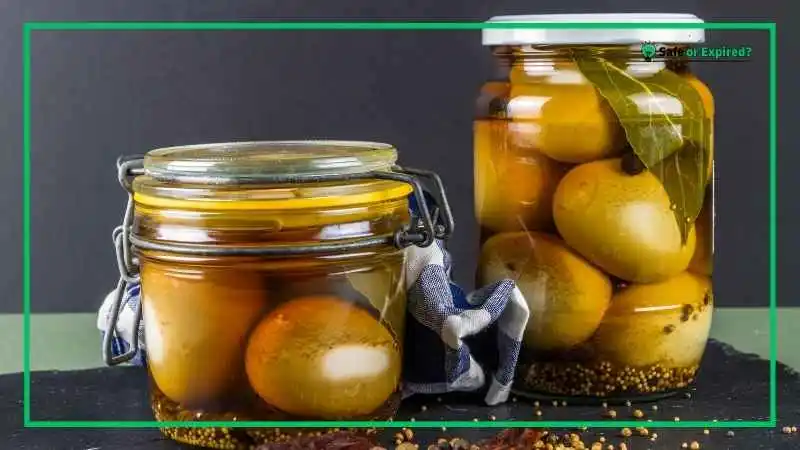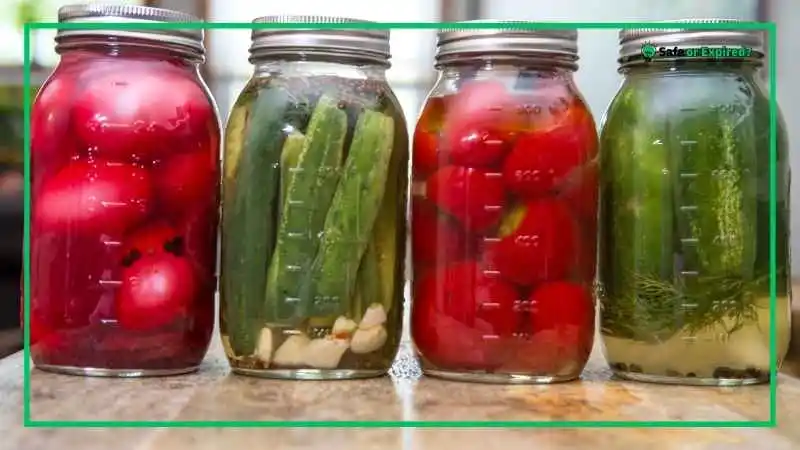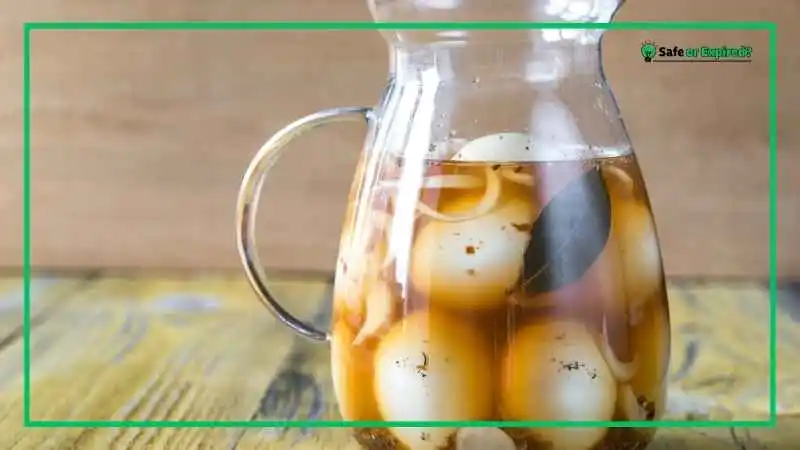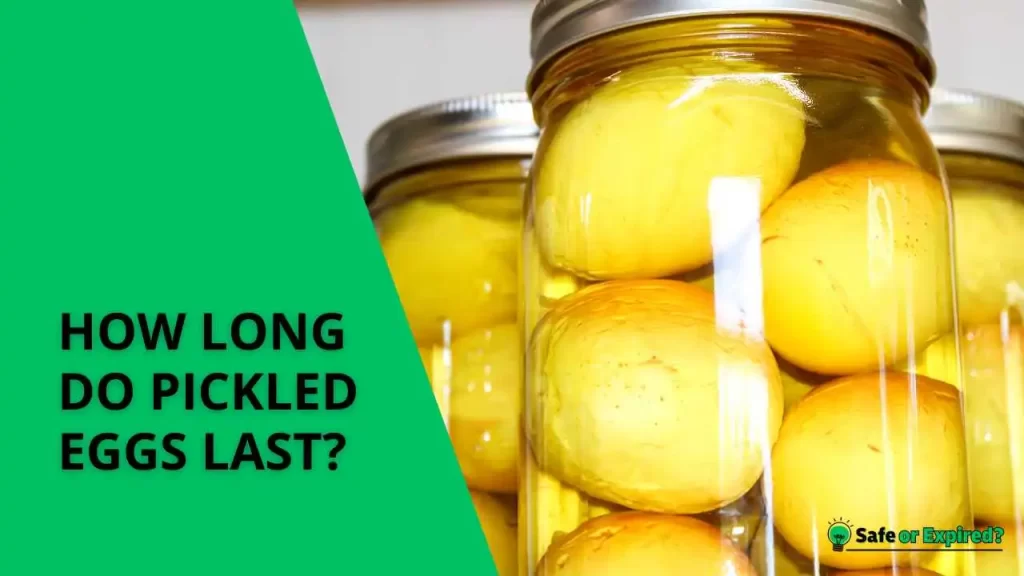“How long do pickled eggs last?” is a popular search on food storage websites. Pickled eggs can last for several months, but it depends on how you store them.
So, don’t go anywhere. Read on to discover all the tips and tricks for making your pickled eggs last their longest!
How Long Do Pickled Eggs Last? All You Need to Know
Pickled eggs can last for several months if stored properly. The exact duration is decided by several factors, such as the method of pickling, the ingredients used, and how they are stored. Generally, unopened pickled eggs can last up to three to four months in a cool, dark pantry.

Once opened, they should be kept in the refrigerator and consumed within a month for the best quality and taste. If not refrigerated, their shelf life decreases significantly, and they should be eaten within a few days.
How Long Do Pickled Eggs Last Unopened?
Unopened pickled eggs can last up to three to four months if stored in a cool, dark place. The pickling solution helps preserve the eggs and prevents spoilage. However, it’s essential to check for spoilage before consuming them, even if they are within the suggested timeframe.
Always ensure that the jar or container is sealed tightly to maintain freshness and prevent contamination.
How Long Do Pickled Eggs Last Without Refrigeration?
Pickled eggs should ideally be kept in the refrigerator to extend their shelf life and ensure safety. If left without refrigeration, they can last for about one to two days at room temperature.

The acidic environment of the pickling solution provides some preservation, but it’s not enough to keep the eggs safe for long periods. Always refrigerate pickled eggs to avoid the risk of bacterial growth and foodborne illnesses.
How Long Do Pickled Eggs Last in the Fridge Once Opened?
Once opened, pickled eggs should be kept in the refrigerator and consumed within one month. The cold temperature does not allow any bacterial growth, which keeps the eggs fresh and safe to eat.
Ensure that the eggs are submerged in the pickling solution and that the container is sealed tightly after each use to maintain their quality.
How Long Do Pickled Eggs Last in the Freezer?
Freezing pickled eggs is not recommended as it can affect their texture and taste. However, if you choose to freeze them, they can last for several months. It’s crucial to place them in an airtight container. Furthermore, I also recommend thawing them in the refrigerator before consuming them.
Keep in mind that the texture may become rubbery and less appetizing after freezing.
| Counter | Fridge | Freezer | |
| Unopened | 1-2 days | 3-4 months | Not recommended |
| Opened | One day | 1 month | Not recommended |
While pickled eggs have a good shelf life, fresh chicken eggs need careful handling to avoid health risks. Discover more about the dangers of consuming expired chicken eggs and how long they typically last.
How Long Do Pickled Beet Eggs Last?
Pickled beet eggs typically last for about one to two months when stored in the refrigerator. The beet juice used in pickling not only adds flavor and color but also contributes to preserving the eggs.
However, it’s essential to keep them in an airtight container and ensure they remain submerged in the pickling solution to maintain their quality and prevent spoilage. As with any pickled product, always check for signs of spoilage, such as off odors or mold, before consuming.
How Long Do Pickled Quail Eggs Last?
Pickled quail eggs can last for up to three to four months when stored properly in the refrigerator. Due to their smaller size, they absorb the pickling solution more quickly than larger eggs, making them flavorful and well-preserved.
How Long Do Pickled Eggs Last in Vinegar?

Pickled eggs stored in vinegar can last for about three to four months when kept in the refrigerator. The acidic environment of the vinegar helps preserve the eggs by inhibiting the growth of bacteria.
For the best results, store the eggs in an airtight container and ensure they remain fully covered by the vinegar. Always inspect the eggs for any signs of spoilage, such as discoloration or off smells, before consuming.
6 Factors Affecting the Shelf Life of Pickled Eggs
The shelf life of pickled eggs depends on several factors, including the storage method, the pickling solution used, the recipe, and whether they are kept unopened or opened. Proper storage, keeping an airtight seal, and refrigerating them can make them last longer.
Storage Method
How you store pickled eggs is super important. If you keep them in the fridge, they can last for about three to four months if unopened. Once you open them, you should eat them within a month. Leaving them out on the counter is not a good idea because they will only last one to two days at room temperature.
Always use airtight containers to keep out bacteria. Also, make sure the eggs are always covered in the pickling juice to stay fresh.
Pickling Solution
The pickling solution you use can make a big difference. A solution with a lot of vinegar is great because the acid helps keep the eggs from going bad. Adding spices and salt can also help them last longer. Always make sure the eggs are completely covered by the solution to avoid spoilage.
Pickled Eggs Recipe
The recipe you use can affect how long your pickled eggs last. Some recipes call for more vinegar, salt, and spices, which can help preserve the eggs better.
If you use a recipe with lots of preserving ingredients like mustard seeds or garlic, your eggs might last longer. Always follow a good recipe and use fresh ingredients.
Unopened vs. Opened
Whether the eggs are unopened or opened is a big deal. Unopened pickled eggs can last up to three to four months in a cool, dark place. Once you open the jar, keep it in the fridge and try to eat the eggs within a month. Opening the jar lets in air and bacteria, which can make the eggs spoil faster. Always close the jar tightly after you take some eggs out.
Temperature
The temperature really matters for pickled eggs. Keeping them in the fridge is the best way to make them last. If you leave them at room temperature, they can spoil quickly. Freezing is not recommended because it can change the texture of the eggs and make them less tasty. If you do freeze them, make sure to thaw them in the fridge before eating.
Airtight Seal
An airtight seal on the jar is crucial. It keeps bacteria and other stuff out that can spoil the eggs. It also stops the pickling juice from evaporating and keeps the eggs covered. Always check that the jar is sealed tightly after you open it and before you put it back in the fridge.
How To Tell if Pickled Eggs Are Bad?
You can tell if pickled eggs are bad or spoiled by looking for changes in color, texture, and smell. If they smell strange, look cloudy, or have a slimy texture, they might be spoiled. Always check for mold or unusual spots on the eggs.
Strange Smell
One of the first signs that pickled eggs have gone bad is a strange or foul smell. When you open the jar, take a sniff. Fresh pickled eggs should smell tangy and vinegary. If you notice a rotten, sour, or any unpleasant odor, it’s best to throw the eggs away. Your nose is a good tool to detect spoilage, so trust it!
Cloudy Liquid
If the liquid in the jar looks cloudy or murky, it might mean the eggs are spoiled. The pickling solution should be clear or slightly tinted from the spices and vinegar. Cloudiness can be a sign of bacterial growth or contamination. Always check the liquid before eating the eggs. If it looks off, it’s safer not to eat them.
Slimy Texture
Another sign that pickled eggs have gone bad is a slimy texture. Fresh pickled eggs should feel firm and smooth. If the eggs feel slimy or sticky, it’s a sign that they are spoiled. This sliminess is usually caused by bacterial growth, which means the eggs are no longer safe to eat.
Always touch and inspect the eggs before eating them.
Mold or Spots
Check the eggs and the inside of the jar for any mold or unusual spots. Mold can appear as green, black, or white fuzzy patches on the eggs or inside the jar. Any unusual spots or discoloration on the eggs themselves can also indicate spoilage.
If you see any mold or spots, do not eat the eggs. Mold can make you very sick, so it’s best to be cautious.
5 Tips for Extending the Shelf Life of Pickled Eggs
To extend the pickled egg’s shelf life, you should store it in the refrigerator. Furthermore, always use fresh ingredients, ensure the eggs are completely submerged in the pickling solution/water, and avoid cross-contamination by using clean utensils.
Store in the Refrigerator
Keeping pickled eggs in the fridge is super important. The cold temperature slows down bacteria growth, which helps the eggs last longer.
Always put the jar back in the fridge after you take some eggs out. Leaving them out on the counter, even for a short time, can make them spoil faster. So, always remember to keep them chilled for the best taste and safety.
Use an Airtight Container
Using an airtight container is key to keeping pickled eggs fresh. An airtight seal prevents air and bacteria from getting in, which can spoil the eggs. After opening the jar, make sure to close it tightly every time.
This simple step helps keep the eggs tasting great and safe to eat for a longer period. So, always check the lid and seal it well!
Always Use Fresh Ingredients
Starting with fresh ingredients makes a big difference. Fresh eggs, vinegar, and spices help create a safe and tasty pickling solution. Old or expired ingredients can introduce bacteria, which can spoil the eggs faster.
So, when you’re making pickled eggs, make sure everything you use is fresh and high quality. This ensures your pickled eggs stay delicious and safe to eat.
Keep Eggs Fully Submerged
Make sure the eggs are always fully covered by the pickling solution. The liquid acts as a barrier, keeping out air and bacteria. If the eggs aren’t fully submerged, they can spoil quickly.
If you notice the liquid level going down, you can add more vinegar to keep the eggs covered. This helps the eggs stay fresh and flavorful for a longer time.
Avoid Cross-Contamination
Using clean utensils every time you take out eggs from the jar is crucial. Dirty utensils can introduce bacteria into the jar, which can spoil the eggs. Always use a clean fork or spoon, and never put your fingers into the jar.
This simple habit helps prevent contamination and keeps your pickled eggs safe to eat. So, always keep it clean and avoid cross-contamination!
Now, you can enjoy your pickled eggs for a longer time while keeping them tasty and safe.
When storing pickled eggs, it’s easy to follow outdated advice unintentionally. Clear up any confusion and ensure your food preservation techniques are up-to-date by reading about the Top Ten Food Preservation Myths that could be misleading you.
Conclusion
The shelf life of pickled eggs can vary based on how you store them and the ingredients you use. Here’s a quick recap:
- Unopened pickled eggs last 3-4 months in the refrigerator.
- Once opened, pickled eggs should be eaten within a month.
- At room temperature, pickled eggs last only 1-2 days.
- Pickled eggs in the freezer can last several months but may change the texture.
By storing pickled eggs properly, you can enjoy their delicious flavor for a longer time. Keep these tips in mind to ensure your pickled eggs stay fresh and tasty!

